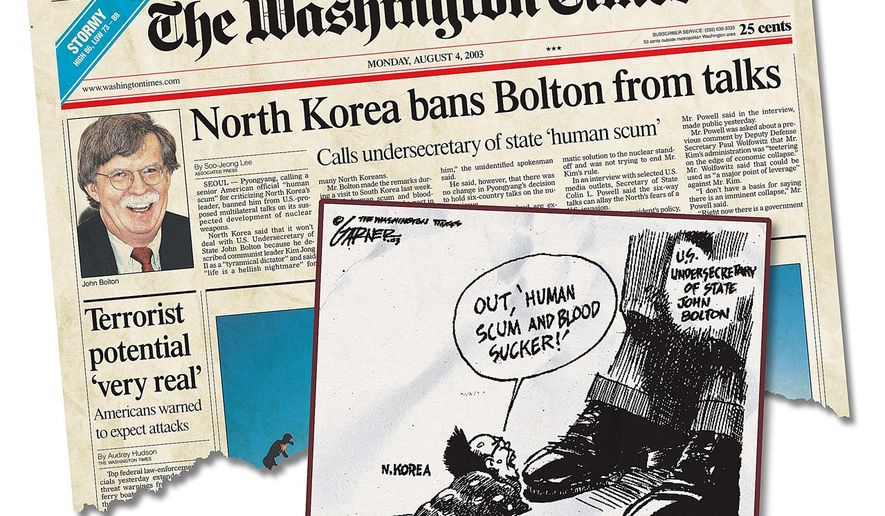OPINION:
President Trump’s speech to the South Korean parliament on the evil of the Kim Jong-un regime was the best so far of his presidency and has been widely described as “Reaganesque.”
I agree, but the address also resembled an important 2003 speech on the North Korean threat by John Bolton titled “A Dictatorship at the Crossroads” when he was undersecretary of State for arms control and international security. Opposition to this speech was similar to the internal opposition that Mr. Trump’s policies are facing today.
In his speech, Mr. Bolton condemned North Korea’s abysmal human rights record, calling the country a “hellish nightmare” and discussed torture by the regime, including chemical and biological warfare experiments on inmates. Mr. Bolton also gave a devastating indictment of Pyongyang for developing nuclear, chemical and biological weapons and ballistic missiles.
The speech enraged the North Korean government and led it to call Mr. Bolton “human scum” and bar him from multilateral talks on its nuclear program. The Washington Times ran a front-page headline story about the North’s nutty reaction to the Bolton speech and published a cartoon of Kim Jong-il as a slug standing before a giant shoe labeled “John Bolton” by the late Times cartoonist Bill Garner. Both were framed and proudly displayed in Mr. Bolton’s State Department office.
There was enormous resistance to Mr. Bolton’s North Korea speech from State Department and intelligence community careerists — now called “the swamp” — who were determined to resist the tough approach to North Korea voiced at the time by President George W. Bush and Mr. Bolton. U.S. Ambassador to South Korea Thomas Hubbard, a career Foreign Service officer, complained to Secretary of State Colin Powell that the speech had not been cleared and accused Mr. Bolton of freelancing. I know Mr. Hubbard’s complaints were false since I was Mr. Bolton’s chief of staff and worked with the author of the speech to ensure it was fully cleared within the State Department, with other government agencies and the White House.
This “swamp” resistance eventually transformed the Bush administration’s tough approach to North Korea during the first Bush term into appeasement by the second. While Mr. Bolton could give speeches about North Korea, he had no control over State Department regional bureaus like the East Asia and Pacific Affairs Bureau (EAP). As a result, EAP found ways to exclude him and other hard-liners from the policymaking process on North Korea.
By 2006, EAP and Ambassador Christopher Hill, the Bush administration’s North Korea special envoy, were working outside the interagency process to coordinate North Korea policy and to keep the few remaining Bush administration hard-liners in the dark.
This led to some horrendous decisions in the second Bush term that continue to haunt U.S. North Korea policy to this day. They included removing North Korea from a state sponsor of terror list and dropping tough banking sanctions after North Korea conducted its first nuclear test in 2006. Physical evidence was found indicating a secret uranium enrichment program and the North turned over a bogus declaration of its nuclear program.
These concessions set the stage for an even more disastrous North Korea policy by the Obama administration called “Strategic Patience,” which led to a huge surge in the North’s nuclear and missile programs.
The lesson Mr. Trump should draw from the Bolton North Korea speech and related experiences is the urgency of ensuring that his policies are fully implemented by the foreign policy bureaucracy. This is difficult because there is a strong resistance to conservative policies — not just those of the Trump administration — by the “swamp.”
Countering this resistance requires extremely good staffing of senior positions — especially political appointees — at the State Department and the National Security Council. Unfortunately, too many of these posts are vacant or staffed with individuals who oppose the president’s policies and are prepared to obstruct them.
Fortunately, there is hope on the horizon. I believe Mr. Trump will do what most businesses do every December: an end-of-the-year performance review of his presidency. Hopefully, this will lead to major personnel changes and the president reassessing the advice of outside advisers who recommended individuals for senior positions who did not work out.
Such a review is urgently needed to implement the president’s policies and to staff his administration with the personnel to do so. Otherwise, President Trump’s North Korea speech will be undermined and ignored by the “swamp” just like John Bolton’s 2003 speech was.
• Fred Fleitz is former chief of staff to Undersecretary of State John Bolton from 2001 to 2005. He served in national security positions for 25 years with the CIA, the Defense Intelligence Agency, the State Department and the House Intelligence Committee staff. He is now senior vice president of the Center for Security Policy.




Please read our comment policy before commenting.